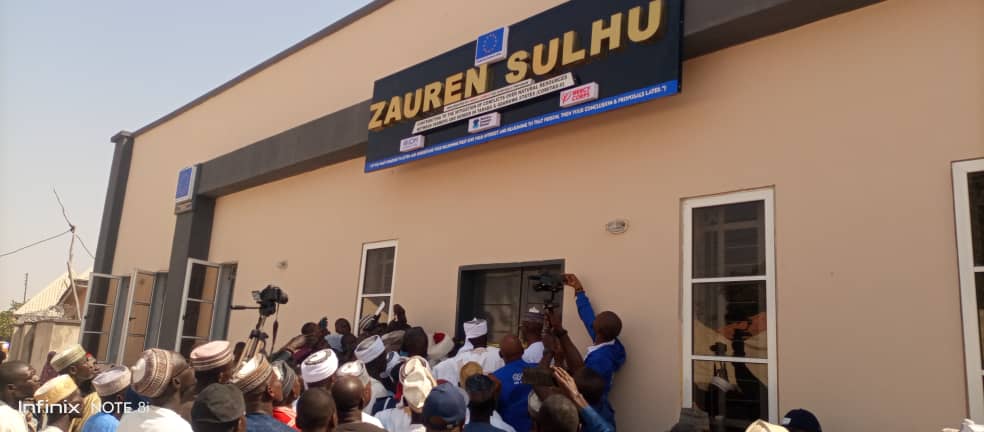The Zauren Sulhu community mediation centre, a beacon of hope for peaceful coexistence between farmers and herders in Adamawa State, Nigeria, has been officially handed over to the Girei Local Government Area. This significant development marks a crucial step in the European Union-funded Conflict Mitigation and Sustainable Development in Communities Affected by Herders-Farmers Conflicts (COMITAS) project, a multifaceted initiative aimed at fostering lasting peace and resolving disputes in the region. The centre, constructed by Mercy Corps, a key implementing partner of the project, provides a dedicated space for trained mediators to facilitate dialogue and negotiate amicable solutions to conflicts, thereby circumventing the often lengthy and costly process of litigation. This approach underscores the project’s commitment to empowering local communities with the tools and resources necessary to manage their own conflicts effectively and sustainably.
The establishment of the Zauren Sulhu centre represents a tangible manifestation of the COMITAS project’s overarching goal of promoting sustainable peace. By providing a neutral and accessible platform for conflict resolution, the centre seeks to address the root causes of farmer-herder conflicts, which frequently stem from competition over scarce natural resources like land and water. The project recognizes the importance of strengthening traditional conflict resolution mechanisms and building trust in local authorities as key components of a sustainable peacebuilding strategy. The centre’s inauguration signifies a shift towards community ownership of the peace process, empowering local stakeholders to take the lead in resolving their own disputes and fostering a culture of dialogue and understanding.
The COMITAS project, a multi-phase initiative, has received substantial financial backing from the European Union. The initial phase, funded with €4.5 million, focused primarily on Adamawa State. Recognizing the project’s positive impact and the need for broader intervention, the EU subsequently allocated an additional €6 million for the second phase, extending the project’s reach to Taraba State. This expansion reflects the EU’s commitment to addressing the complex challenges of farmer-herder conflicts across the region and fostering sustainable solutions for peaceful coexistence. The combined €10.5 million investment underscores the significance of the project and the EU’s dedication to supporting peacebuilding initiatives in Nigeria.
The genesis of the Zauren Sulhu mediation centre lies in extensive consultations with local stakeholders in Girei. Project implementers, recognizing the importance of community involvement, engaged with residents to identify the most pressing needs and develop tailored solutions. These consultations revealed the critical need for a dedicated space for conflict mediation, a solution that resonated deeply with the community. The centre, therefore, emerged as a direct response to local priorities, reflecting the project’s commitment to a bottom-up approach to peacebuilding. This participatory approach ensures that the project’s interventions are relevant, effective, and sustainable in the long term.
The official handover ceremony of the Zauren Sulhu centre was attended by key stakeholders, including representatives from Mercy Corps, the International Organization for Migration (IOM), and local authorities. Tog Gang, representing Mercy Corps, emphasized the centre’s role in providing accessible and legally sound conflict resolution services. Amos Nderi, Project Manager for COMITAS II under IOM, lauded the centre as a symbol of the project’s commitment to sustainability and community ownership. Emmanuel Melaiye, Project Manager for COMITAS II at Mercy Corps, reiterated the community-driven nature of the initiative, highlighting the consultative process that led to the centre’s establishment.
The inauguration of the Zauren Sulhu centre by Dr. Ahmed Mustapha, the District Head of Girei, on behalf of the state government and traditional institutions, underscores the project’s broad-based support and its alignment with local governance structures. Dr. Mustapha commended the EU and its partners for their significant contribution to peacebuilding in the region, acknowledging the positive impact of the COMITAS project in fostering relative peace and strengthening traditional conflict mediation processes. The collective endorsement of the centre by various stakeholders reflects a shared commitment to peaceful coexistence and the recognition of the centre’s potential to contribute significantly to conflict resolution in Girei and beyond.














